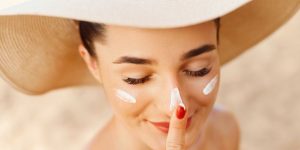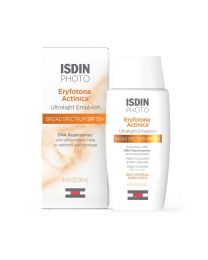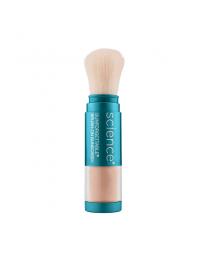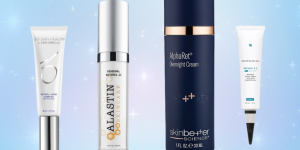Free Shipping Over $100
Free Samples With Every Purchase
Auto Replenishment Available
Authorized Reseller
How to Find a Sunscreen that Doesn't Leave White Cast

With the warm summer rays here to stay for the foreseeable future, sunscreen application is more important than ever. Whether you’re only outside to walk to your car and drive to your air-conditioned destination or you love spending the whole day in the summer sun, applying a good sunblock should be part of your daily routine. Many people find sunscreens frustrating because they leave behind a dull, white cast over skin. This is especially frustrating for people of color since the white hue of sunscreen residue is much more noticeable on darker skin tones. If you want to make sunblock part of your daily skincare routine but that unsightly white cast is keeping you away, we’ve got great news. There are numerous dermatologist-recommended sunscreens that are specifically formulated to be fully absorbed into skin without leaving behind residue. Some are even customized to be flattering for specific skin tones. In this blog, we’ll go over what causes white cast in sunscreen and describe dermatologist-recommended sunscreen that doesn’t leave a white cast behind.
Understanding the Causes of White Cast in Sunscreens
White cast is commonly caused by the ingredients zinc oxide and titanium dioxide found in physical sunscreens. These minerals are white, and they remain on the surface of skin to create a protective barrier that blocks out sun’s UVA and UVB rays. This can leave skin looking chalky.
Mineral Sunscreen vs. Chemical Sunscreen
When it comes to mineral vs chemical sunscreen, white cast is much more likely with mineral sunblock, sometimes called physical sunscreen. The key ingredients, zinc oxide and titanium dioxide, are both designed to stay on the surface of skin to protect it from the sun’s rays. Unfortunately, this means sunblock may be visible on the surface of skin for several minutes or hours after application. It can also feel greasy or sticky on the surface of skin. However, there are new formulations available that minimize these drawbacks.
Chemical sunscreens are fully absorbed into skin. Rather than blocking out UVA and UVB rays, they filter the harmful rays preventing damage. While it may seem like a natural choice to simply switch to a chemical sunscreen, these products aren’t recommended for children or pregnant women. They may also be harmful to pets and wildlife. For people who surf or dive, these sunscreens are usually not “reef safe,” which means many beaches ban the use of chemical sunscreens. While they are harmless for most people, the long-term effects of chemical sunscreen use aren’t clear. Additionally, these products don’t actually prevent sun’s UVA and UVB rays from reaching skin. They change the way these rays interact with our skin in the short term by minimizing risk for sunburn, but it’s unclear if these products are as beneficial to prevent the long-term effects of sun damage like accelerated aging and skin cancers.
Tips for Finding a Sunscreen that Doesn’t Leave a White Cast
A dermatologist is unlikely to say that one product is right for everyone, but when it comes to sunscreens, almost all dermatologists are on the side of mineral sunblock despite the obvious drawbacks. Simply put, they are generally safer and more effective than the chemical alternatives. However, no product is right for everyone. When you’re shopping for a no white cast sunscreen, consider some of the following factors:
- • Check the marketing – look for products labeled as “invisible” or those that have skin tone matching options.
- • Choose tinted sunscreens – these products add iron oxides to the mineral formula. Iron has a darker coloring that allows the sunscreen to more closely match or blend with natural skin tones.
- • Try it before you buy it – whenever possible, look for sunscreens in travel size or even in-store testers or samples. This allows you to try the sunscreen on your skin tone before you invest in a full bottle.
- • Make sure you’re applying correctly – many people are unhappy with the white cast left behind by their sunscreen, but in some cases, changing the application method prevents much of this concern. Apply sunscreen at least 15 minutes before you leave to give it plenty of time to absorb and be set in place. Make sure you apply the right amount by gently patting the sunscreen to spread it over skin without rubbing. Rubbing in mineral sunscreen can actually remove the product and make it less effective.
- • Consider a chemical sunscreen – for some people, this is the preferable option. Make sure to find safe products that are cleared by the FDA and never use chemical sunscreens on infants or
 young children.
young children. - • Consult a dermatologist – as skincare experts, dermatologists can help you find the best sunscreen option for your skin tone and skin health needs.
Recommended Products
If you’re looking for the best sunscreen for no white cast or residue, consider a few of our dermatologist-recommended options.
- • Skinbetter Science Sunbetter TONE SMART SPF 68 Sunscreen Compact – a facial sunscreen applied like a powder foundation to block out the sun’s damaging rays. This product is like a light bronzer. It highlights and smooths skin, creating a flawless, natural finish for any skin tone. Don’t like the bronzed look? Try the Sunbetter SHEER SPF 56 Sunscreen Compact.
- • Revision Skincare Intellishade TruPhysical – Revision Skincare products are developed with long-term skin health and radiance in mind. It’s
 no surprise that this all-mineral sunscreen is ultra-gentle, and it soothes and repairs damaged skin as it protects against sun damage. The unique intellishade technology incorporates light-diffusing ingredients that blur imperfections in skin and improve brightness and evenness for any skin tone.
no surprise that this all-mineral sunscreen is ultra-gentle, and it soothes and repairs damaged skin as it protects against sun damage. The unique intellishade technology incorporates light-diffusing ingredients that blur imperfections in skin and improve brightness and evenness for any skin tone. - • ISDIN Eryfotona Actinica SPF 50+ – this mineral sunscreen for the face absorbs like a chemical sunscreen, so it doesn’t leave skin looking chalky. It’s water-resistant and utilizes DNA Repairsome technology to reverse existing sun damage as it protects skin.
- • ALASTIN Skincare HydraTint Pro Mineral Broad-Spectrum Sunscreen SPF 36 – this sunscreen is formulated for UVA and UVB protection as well as protecting from damaging infrared rays and pollutants. The lightweight, residue-free formula won’t leave skin with a white cast. In addition to unparalleled sun protection, this product also provides healing moisture to repair sun-damaged skin.

- • EltaMD UV AOX Elements Broad-Spectrum SPF 50 – this tinted facial sunscreen truly goes the extra mile. It offers broad-spectrum protection from UVA and UVB rays, but it also protects against blue light damage and environmental aggressors. The rich, hydrating antioxidant formula goes on
 smooth, and the tinting ingredients blur skin imperfections for all skin types.
smooth, and the tinting ingredients blur skin imperfections for all skin types.
If you want skin tone specific sunscreen option, consider one of the innovative ColoreScience Sunforgettable Total Protection sets. They include a Face Shield FLEX spray on and a Brush-On Shield, and they come in a range of skin tones, including:
- • ColoreScience Sunforgettable Total Protection Fair
- • ColoreScience Sunforgettable Total Protection Tan
- • ColoreScience Sunforgettable Total Protection Medium
- • ColoreScience Sunforgettable Total Protection Deep
Choose the Right Sunscreen for You
Finding the right sunscreen for you may come down to trial and error. The most important thing is that you keep using sunscreen every day no matter what your skin tone. If you’re really struggling to find a product that doesn’t leave you looking like your skin has a white cast, consider consulting with a dermatologist. They can help you find an ideal sunscreen for your skin tone and your skin health needs.
Explore Our Wide Range of Skincare Essentials
Sunscreen is just about the most important element in any skincare routine, but it’s not the only element. DermSkincare has a range of skincare products from gentle cleansers to products formulated for specific skin conditions. We hope you’ll take some time to explore our site to see all that we have to offer.
-
Colorescience Sunforgettable Total Protection Brush-On Shield SPF 50 - Deep (0.21 oz)Regular Price $69.00 Now Only $55.20






















